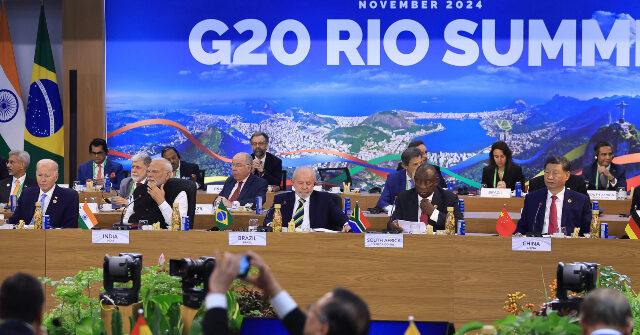The G20 summit in Rio de Janeiro, hosted by the leftist Brazilian President Luiz Inácio Lula da Silva, is generating controversy for its approach to the ongoing conflicts in Ukraine and Israel. Reports from the Argentine outlet Infobae indicate that Lula is striving for a joint statement that neither explicitly condemns Russia for its actions in Ukraine nor includes strong language against Israel for its military response to Hamas. This stance highlights Lula’s attempts to navigate complex geopolitical relationships, balancing the positions of various world leaders while promoting an agenda that aligns with his left-leaning ideology.
In recent weeks, Lula has increasingly vocalized his criticisms of Israel, accusing the nation of committing atrocities likened to “genocide” and drawing parallels to historical events such as the Holocaust. These comments follow a surge of violence after Hamas’ attack on October 7, 2023, resulting in significant backlash and deteriorating diplomatic relations between Brazil and Israel. Lula’s rhetoric reflects a broader trend among leftist leaders in Latin America who are united in their criticisms of Israel’s military actions in Gaza, suggesting a coordinated effort to challenge Western narratives on the conflict.
Within the G20 context, Lula’s positioning is not merely a domestic issue but bears international implications. Brazil, hosting the summit for the first time, leverages its status to advocate for what is seen as a more favorable stance towards nations like Russia, Turkey, and Iran, potentially at the expense of the interests of the United States and its allies. This shift raises questions about the future of international relations and the effectiveness of multilateral organizations like the G20 in navigating and resolving global conflicts while accommodating diverse national interests.
As negotiations unfold, there’s tension regarding Lula’s draft proposal, which reportedly emphasizes a ceasefire in Gaza and aligns with various nations’ preferences without addressing Ukraine’s plight directly. The Brazilian government faces pressure from European nations eager to include stronger condemnations of Russia’s aggression, particularly following recent attacks on Ukrainian infrastructure. However, Lula’s administration is wary of reopening discussions on sensitive topics, fearing that such actions might jeopardize the summit’s conclusion and produce no joint statement at all.
Amid the complexities of international diplomacy, Lula’s insistence on focusing the G20 conversation on broader issues such as poverty, climate change, and social justice presents a unique perspective. He argues that concerns about war overshadow the urgent needs of “invisible” populations, suggesting that the conversations at the summit should prioritize the challenges faced by those unaffected by global conflicts. This approach raises an important dialogue about the priorities of world leaders and their responsibility to address both immediate crises and long-standing global issues impacting marginalized communities.
In essence, the G20 summit serves as a critical juncture where Lula’s radical leftist ideologies are tested against the backdrop of global politics. The outcomes of these discussions may signal the future trajectory of Brazil’s foreign policy and reflect the increasing polarization among nations regarding key issues like war, peace, and humanitarian concerns. As the world watches the unfolding events in Rio de Janeiro, the implications of Lula’s leadership decisions will be felt far beyond Brazil’s borders, shaping international relations in the years to come.

